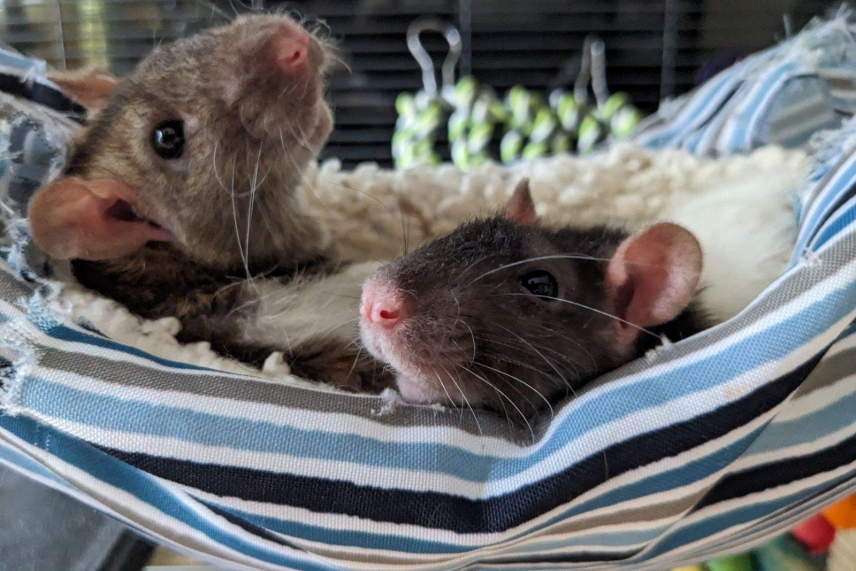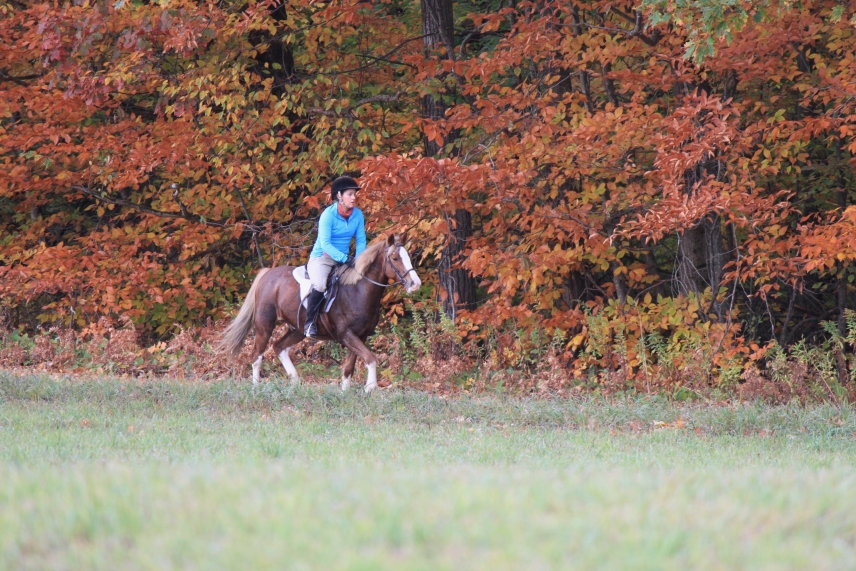
Jullien Flynn
Courtesy of Jullien Flynn
Meet a Whitehead Postdoc: Jullien Flynn
Jullien Flynn is a postdoc in Whitehead Institute Member Yukiko Yamashita’s lab studying satellite DNA and its potential links to disease. We sat down with Jullien to learn more about her and her experiences in and out of the lab.
What is your research focus?
I study a type of repetitive DNA called satellite DNA, which are DNA sequences that are repeated many, many times in a row—often millions of times in a row—and don't make any proteins. It was discovered 50 years ago and we still don't really understand its significance or impact on the genome, both because it's challenging to study and because it's often been dismissed since it doesn't look like a typical, functional part of the genome. However, it takes up a huge amount of the genome: in humans, it's around 8% and in some fruit flies that I study it’s up to 50%. It's located near a critical part of the chromosome called the centromere, which controls how chromosomes segregate during cell division, which is really important in development. Also, satellite DNA changes more than any other part of the genome.
I study how satellite DNA may be especially prone to challenges like DNA damage, and how it may be an especially vulnerable part of the genome, such that when problems occur, it can sometimes lead to major chromosome instability that may have an impact on disease. For example, many cancers are associated with chromosome abnormalities, and if chromosome abnormalities occur in sex cell development or fetal development, it can lead to inviable pregnancy and miscarriages. Those are some of the most common health issues that are relevant to what I'm working on right now.
When you were a little kid, what did you want to be when you grew up?
I wanted to be an animal trainer. I really liked connecting with animals. I thought it was amazing to be able to connect with animals without having a common spoken language, simply using body language.
Are animals still a big part of your life?
Yes, I still really like connecting with animals. I have pet rats. That’s kind of an atypical pet, but they are very easy to train. Also, I do horseback riding, although I'm a bit lapsed now living in Boston. I grew up horseback riding, and taught horseback riding lessons for many years, and in grad school especially I had the opportunity to train quite a few horses. It’s a hobby of mine to work with horses and have them really improve in their confidence and how they communicate with their rider. Working with horses has helped me in other aspects of my life, because you have to learn how to control your emotions and how you express them. A horse can sense if you're tense or scared, or if you're not sure of what you're doing, so you have to learn to have confidence and to communicate that to the horse. I think in science, also, it’s important to build your confidence, and to know the things that you need to be thinking about as you are working and trust yourself in that process. I see a lot of parallels there.

Jullien’s pet rats, Missy (left) and Jojo (right).
Ari Ira
How did you decide to get into a research career?
In high school, I really liked biology. The other kids in my class who liked biology wanted to be doctors. I didn't want to be a doctor, although I didn’t actually know what other careers there were for people who like biology. I figured I’d go to university and take biology and something would turn up. Then after my first year of university, I was looking for a summer job back in my hometown. There was only one job related to biology available, which was working in a government research lab. I got that job and to my surprise, because I wasn't good at the lab courses in my first year of undergrad, I was actually good at working in the lab. From there, I started to find opportunities back at the university to work in an academic research lab. I found that I really liked the environment and the ability to be curious and ask questions and gain more understanding about how things work.
What do you think was the difference between working in a lab versus a lab course that helped you to excel there?
In the lab course, I felt like I was being evaluated all the time. I would mess up and the TA might notice that I messed up and it could affect my grade. I found the lab to be a more supportive environment for me to learn how to do various techniques. I thought, sometimes mistakes happen and that’s okay. That’s normal. Without the pressure of being in a course, I discovered that I was actually good at a lot of techniques.
How did you get involved with the Whitehead Postdoc Association, and how has that been important to you?
I got involved with the Postdoc Association for several reasons. It is a good venue for communicating with the administration and advocating for the postdoc community. One topic that I really wanted to address was salary and benefits. I moved here in 2021 and was in a particular situation where my husband and I both came here on visas and he didn’t have a work permit, so we were a single income household. I discovered that, due to the high cost of living in this area and the strict income requirements set by landlords, I could not rent an apartment on my salary. I was very surprised that as someone with a PhD, working at one of the most prestigious research institutes in the country, I couldn’t support myself to get a one-bedroom apartment. The situation also made me think about postdocs in an even less privileged situation who might not be able to accept a job here because they can’t afford to live here, so I really wanted to work to get our salary up to a level where a postdoc can support themselves. And I’m really glad that the administration has worked with us on that and boosted our salaries. The benefits have improved as well. I think the expanded parental leave policy is going to be especially impactful for a lot of postdocs.
The other thing that got me really interested in joining the Postdoc Association is that in my first year here, I didn't really have the chance to meet any other faculty members besides my own PI [lab head]. There wasn't really anything set up that would facilitate interactions with other PIs. Through meetings with other postdocs, we set up this program, the Second Mentor program, to give people the framework to have meetings and discussions with other PIs. Postdocs get matched with PIs to meet and have discussions with, to get a different perspective than from their own PI. I think that's really beneficial for their career development, and for lots of different reasons.

Jullien and Parker (Welsh pony) compete in a hunter pace event in Ithaca, NY.
Linda Santos
Where do you see yourself in ten years?
I see myself leading a research lab and teaching. I think the most important part of my career as a scientist is to mentor students and trainees. It’s been great to work with junior scientists at Whitehead Institute. I really appreciate the summer programs to bring in high schoolers and undergraduates. I want to make new discoveries and do good science, but the number one priority is to provide high quality mentoring and training to support students to go on and reach their own career goals.
What are your hobbies outside of work?
I like running and triathlon. I really like trail running; I like running in the Fells. I did one adventure race, where I needed a compass to navigate, that I really had to practice. I bought a compass and went into the Fells, which has a spider web of many trails, and I told myself: I'm going to do a new trail loop configuration, run for 75 minutes, and get back to the same point that I started using only a compass. It went well. I really like the adventure aspect of running and discovering new places. I don't like to just repeat the same route over and over. I always like to find new and exciting routes and challenge myself a little bit. It’s really fun to not quite, but almost, get lost sometimes.
Topics
Contact
Communications and Public Affairs
Phone: 617-452-4630
Email: newsroom@wi.mit.edu


